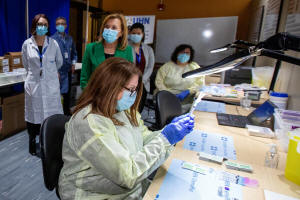As Canada battles rising COVID-19 cases, lack of sick leave fuels
transmission
 Send a link to a friend
Send a link to a friend
 [January 12, 2021]
By Anna Mehler Paperny [January 12, 2021]
By Anna Mehler Paperny
TORONTO (Reuters) - As Canadian provinces
struggle to contain rising COVID-19 infections, a lack of adequate paid
sick leave for front-line workers is fuelling transmission, doctors and
advocates say.
While political leaders and health officials advise sick people to stay
home, many people can't afford to. Some 58% of workers in Canada lack
enough paid sick leave, according to the Decent Work and Health Network,
and that percentage rises as wages drop.
One morning last spring, 67-year-old part-time support worker Susan woke
up feeling "a hurt in my heart like a knife." She went to work at a
Toronto rehabilitation home anyway -- she said it was the only way to
pay the bills. Susan, who is using an pseudonym for fear of professional
repercussions, had no sick days and couldn't afford to miss even a day's
pay.
She told Reuters she felt pressured to go in to work.

As her symptoms worsened, she took a COVID-19 test, which came back
positive.
"I went to work two days sick and I was scared to call in sick because
they don't believe you. That's ridiculous. It should not be like that,"
Susan said.
Reuters reached out to the home, which confirmed there was a coronavirus
outbreak in the spring. It said the exact source is unknown.
Canada's federal government launched a program last fall that provides
money after the fact to people who have had to miss work due to
COVID-19. Critics charge it does not provide the same security sick
leave would.
Some 60% of the long-term care workers represented by SEIU Healthcare, a
union, are part-time. Even if they do get paid sick days it averages
three days a year, said president Sharleen Stewart.
"Believe me, they do not want to go to work sick. They have no choice:
They have to put food on the table," Stewart said.
That's causing transmission in their workplaces.
"Our experience has been that outbreaks in long-term care tend to be
introduced by workers," Ontario's Associate Chief Medical Officer of
Health Barbara Yaffe told reporters last month.
STARK CHOICE
As the number of COVID-19 outbreaks and deaths in long-term care homes
rise, the pressure to work while sick worries doctors like Samir Sinha,
Director of Geriatrics at Mount Sinai Hospital and University Health
Network in Toronto.
"It's a system that is increasingly not there for workers and it's
making residents sick," he said.
[to top of second column]
|

Pharmacy technician supervisor Tamara Booth Rumsey prepares a
Pfizer-BioNTech coronavirus disease (COVID-19) vaccine at The
Michener Institute, in Toronto, Canada January 4, 2021.
REUTERS/Carlos Osorio

The issue exists in non-health sectors, as well. In Peel Region west
of Toronto, home to the industrial hubs surrounding the country's
largest airport, many front-line employees are faced with the stark
choice: obeying isolation guidelines or feeding their families, said
Lawrence Loh, the region's Medical Officer of Health.
"Peel Public Health has definitely seen certain outbreaks that have
been seeded by workers that needed to break isolation early or may
have worked through mild symptoms," Loh said.
"Lack of paid sick days is a deterrent to isolation, it's a
deterrent to detection and it's a deterrent to them getting the
support they need."
Loh pointed to places like Germany, where he says guaranteed paid
sick leave helped contain the pandemic.
In November, Peel Region said it would start charging employers up
to $5,000 per day for failing to take "necessary action" to stop the
spread of COVID-19 in the workplace.
The action stops short of imposing paid sick leave, the press
release said, because that was outside the health region's power.
Provincial governments point to Canada Recovery Sickness Benefit
when asked why they won't guarantee paid sick leave.
But the program requires users navigate a government website for
paperwork and the payout is delayed, which means someone could be
waiting weeks for missing grocery or rent money, said Deena Ladd,
executive director of the Workers Action Centre.

Ontario Labour Minister Monte McNaughton said the province has
"spared no expense" to keep COVID-19 out of workplaces. But when
asked about mandating paid sick leave he referred to the federal
program.
"My message is, if you're sick, stay home."
(Reporting by Anna Mehler Paperny; Editing by Denny Thomas and
Aurora Ellis)
[© 2021 Thomson Reuters. All rights
reserved.] Copyright 2021 Reuters. All rights reserved. This material may not be published,
broadcast, rewritten or redistributed.
Thompson Reuters is solely responsible for this content. |